Software Engineering vs. Software Development: What’s the Difference?
 Erika Magpili
March 5, 2021
Erika Magpili
March 5, 2021
“The difference between a software developer and a software engineer is the same as the difference between big and large.” — Unknown
Software engineering and software development are related fields but have distinct functions in the tech world. Software development focuses on coding, testing, and maintaining applications, with developers handling specific tasks in the software development life cycle (SDLC). Their work is often creative and tailored to individual projects. In contrast, software engineering takes a more structured approach. Engineers apply engineering principles to design, develop, and maintain entire systems. They are involved in all phases of the SDLC, from planning to deployment, and they often work with various teams and stakeholders.
Both roles are crucial in creating innovative software, offering rewarding career paths with significant opportunities for growth.
Software Development VS Software Engineering
Software development and software engineering are intertwined, but each has a unique focus. Software development primarily involves coding and code maintenance, whereas software engineering covers a wider range of activities. The key differences are explained below:
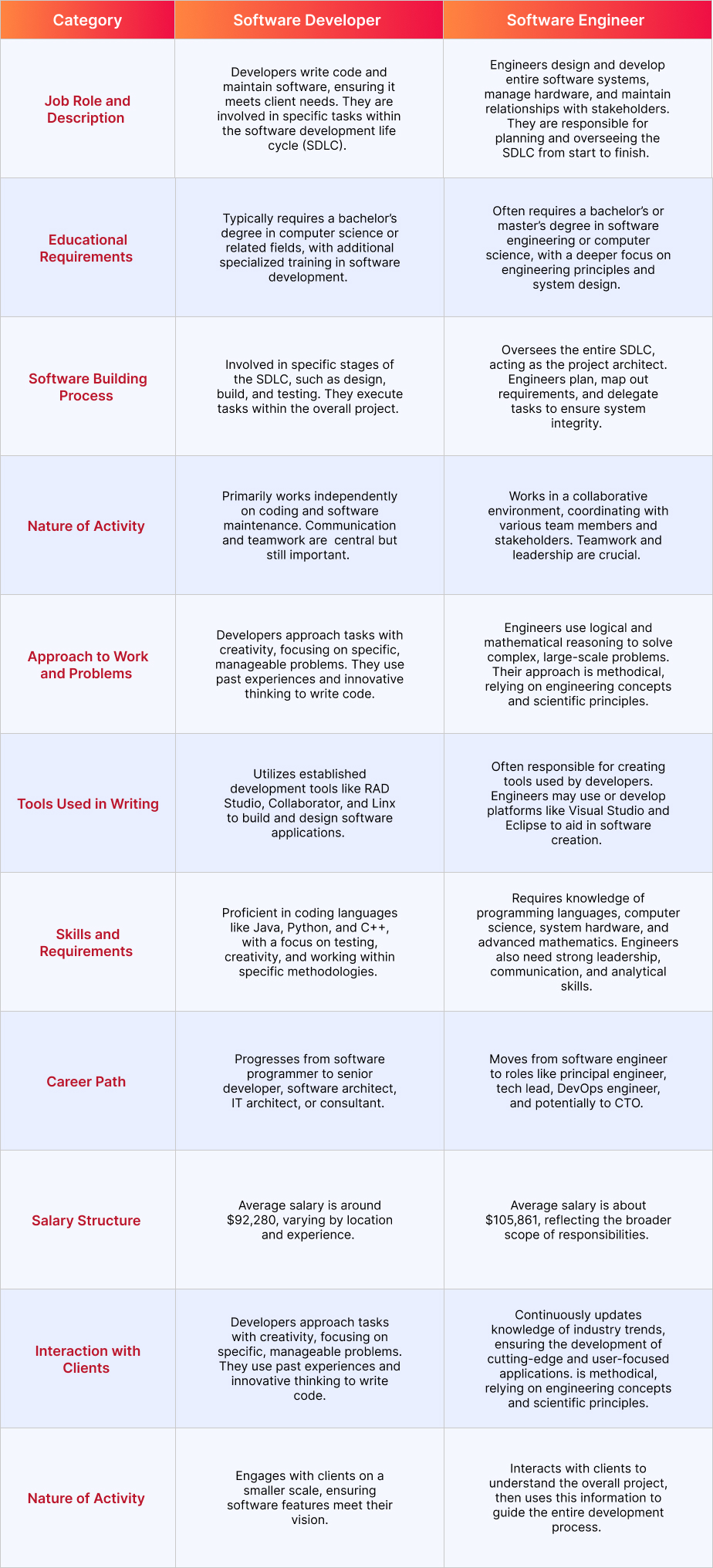
Both software engineering and software development have a bright scope in the IT and business industry's future. The key difference between them lies in their responsibility. Software Engineering focuses solely on engineering, while software development creates a completely functional program.
Software Developer VS Software Engineer Skills
Understanding the skills that differentiate software developers from software engineers is crucial for identifying their unique roles in the tech industry. While both professions involve coding and problem-solving, their skill set varies, as explained below:
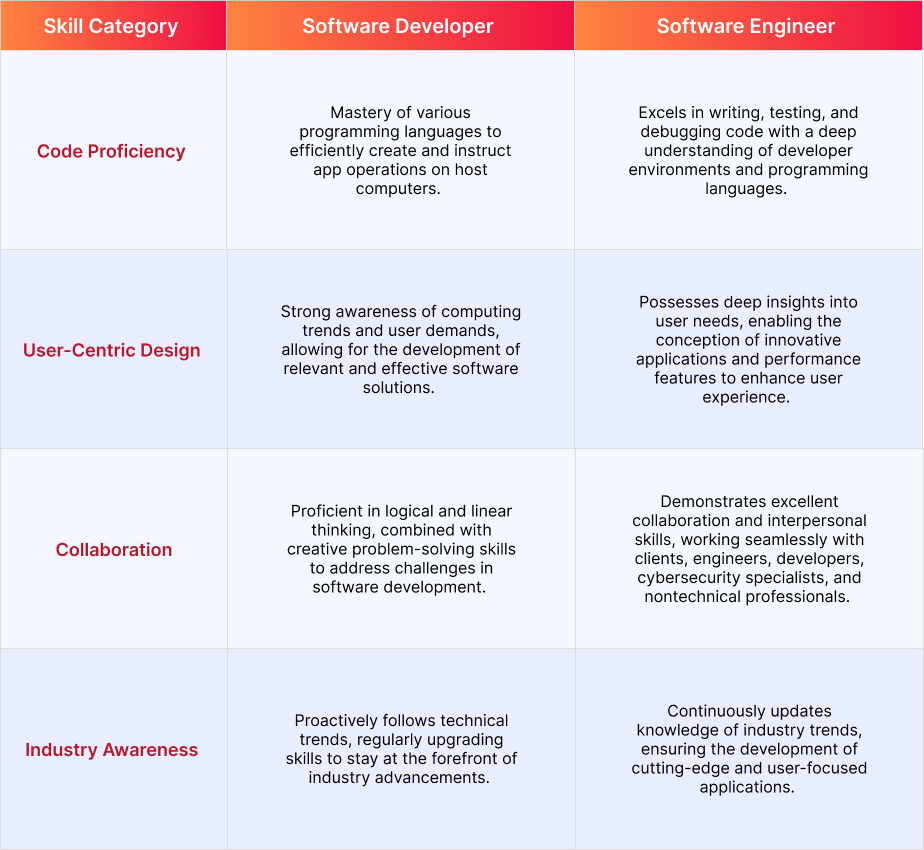
Introduction to Software Engineering
Software engineering involves the systematic design, development, and maintenance of software systems guided by engineering principles. This approach ensures the software is reliable, efficient, and tailored to meet user requirements. By utilizing these principles, software engineers develop scalable solutions that optimize experience.
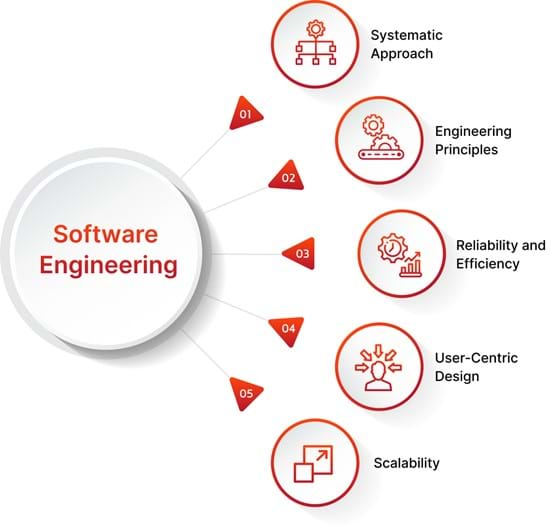
Software Engineer Duties and Responsibilities
The business environment relies heavily on software for many functions. A software engineer oversees the entire software engineering development cycle, from designing, testing, and developing software to meeting a business's specific needs. Given the role's breadth, software engineers should have technical expertise and extensive knowledge of using open-source tools.
The typical software engineer’s duties and responsibilities include:
- Identifying the issues and common patterns by standard operating procedures to improve the quality of a system
- Distinguishing and making recommendations on the areas that need improvement
- Designing and implementing systems to enhance an application
- Maintaining and improving existing codebases
- Coordinating with colleagues to implement technical designs
- Investigating and using new technologies that are relevant to the process
- Providing and documenting written knowledge transfer material through diagrams and flowcharts and developing computer instructions through algorithms
Best Practices for Software Engineers
The best practices that drive software engineers to deliver high-quality, ethical, and client-focused solutions are as follows:
- Ensuring that the products and related modifications meet the highest professional standards beneficial to the client and the employer
- Maintaining integrity and self-sufficiency in their professional approach
- Promoting ethical practices for software development and maintenance
- Assisting and working hand-in-hand with the rest of the development team
Why is Software Engineering Important?
Software Engineering is an integral part of business development. Engineers work to accommodate the ever-changing requirements and needs of the market.
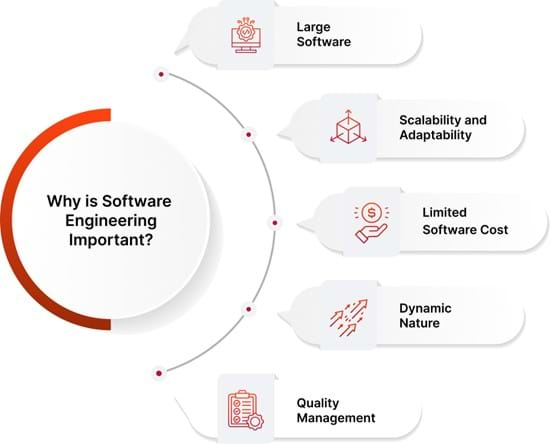
- Large Software: As software grows in complexity, software engineering offers a scientific approach to applications, giving you a competitive edge in the industry.
- Scalability and Adaptability: It is easier to recreate new software than scale an existing one if the software process is not based on scientific and engineering concepts. Software Engineering adapts to every business's growth or changes in market needs, allowing your business to expand as much as necessary.
- Limited Software Cost: The most significant driving force in software engineering is cost. Though the cost of computers and hardware manufacturing has significantly decreased, companies would preferably invest in perpetually licensed software rather than purchase a tool that still needs to be installed on different devices.
- Dynamic Nature: The nature of the software is constantly growing and adapting. Software Engineers create a viable solution depending on the user's environment.
- Quality Management: Software Engineering offers a better, theoretical software development method for providing quality software products that cater to the client's specific needs.
Is a Software Engineer in Demand?
The demand for software engineers continues to grow, offering promising career advancement opportunities. As engineers gain experience, they progress through various stages of leadership, responsibility, showcasing their expertise, and commitment to the field.
- 0-3 Years: New engineers rapidly build expertise by creating, launching, and debugging systems or applications, establishing a strong foundation in the industry.
- 3-5 Years: With three to five years of experience, engineers often advance to senior roles, leading teams and demonstrating leadership abilities.
- 6-9 Years: Engineers often move into tech lead positions, manage teams, and take on increased responsibility after six to nine years.
- 13+ Years: With 13 or more years of experience, engineers often rise to engineering manager or VP roles, overseeing processes or products. They may even become Chief Technology Officers (CTO), guiding an organization’s technological direction.
Introduction to Software Development
Software Development is the driving force behind every creative software program. It refers to the process which programmers follow to build computer programs such as Photoshop, mobile apps, and web apps.
While software development refers to everything related to creating programs, its more specific version is Software Development Life Cycle (SDLC), which refers to a series of steps for building end-user products that meet the user's technical specifications and requirements.
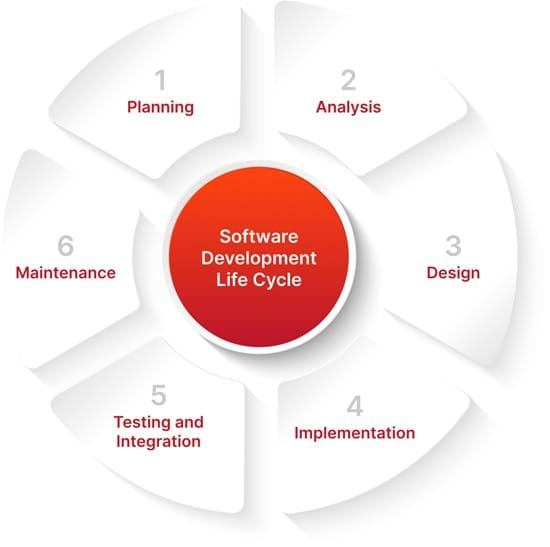
Software Developers are responsible for the overall development of software. Developers work on specific project areas to create appropriate programming codes that help the software function smoothly.
Software Developers Duties and Responsibilities
The role of a Software Developer depends on the client's needs. A Software Developer is a mastermind behind computer programs. Their job is to analyze the user's demands and focus on creating, testing, and developing a complete functioning program to improve user experience.
With such a complex role, Software Developers must have a good balance of hard and soft skills. These professionals must possess excellent analytical abilities and precise technical knowledge required to enhance the software regularly.
The typical Software Developer’s duties and responsibilities include:
- Providing technical guidance and overseeing the entire development process of the product
- Researching, designing, implementing, and managing software programs
- Developing a well thought out plan to meet a client's needs
- Conducting experimental software to ensure quality and consistency
- Writing and implementing efficient code
- Developing quality assurance procedures
- Maintaining and upgrading existing systems
- Building tools for improving internal productivity
Best Practices for Software Developers
Below are the best practices to enhance your coding efficiency and drive successful outcomes in software development:
- Understanding and creating a code that will help drive the overall business.
- Generating program code and use it effectively in a project
- Documenting coding goals and map out how to approach immediate coding tasks
- Starting work on the most challenging part of the project
Why is Software Development Important?
Software development plays a crucial role in today's digital landscape, offering numerous benefits that drive business success:
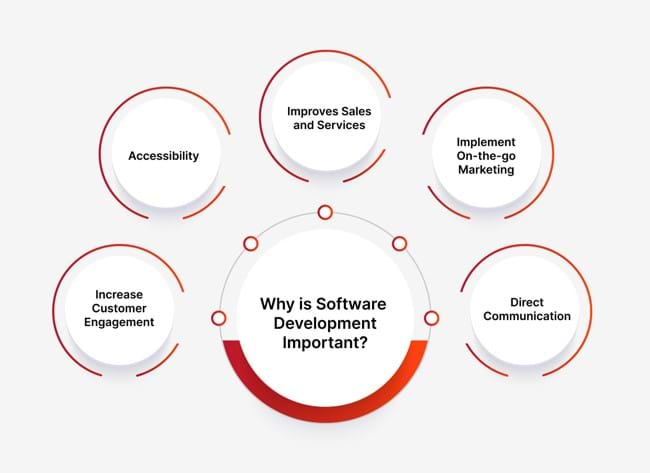
- Increase Customer Engagement: Well-designed software helps businesses connect with their customers more effectively, enhancing interaction through personalized and user-friendly platforms.
- Accessibility: With software, businesses can reach a global audience, ensuring their products and services are accessible anytime, anywhere.
- Improves Sales and Services: Efficient software streamlines sales processes and customer services, resulting in increased revenue and better customer satisfaction.
- Implement On-the-go Marketing: Mobile and web applications allow businesses to market their products in real-time, capturing opportunities and reaching customers on the go.
- Direct Communication: Custom software enables direct communication between businesses and customers, fostering trust, loyalty, and faster responses to customer needs.
Understanding the Role in Workplace: Web Developer Vs Software Engineer
Understanding the roles of web developers and software engineers in the workplace reveals key differences in collaboration and focus. Web developers often work independently, primarily focusing on applications or operating systems, with limited interaction with others. In contrast, software engineers typically engage in more collaborative environments, working closely with teams, including developers, engineers, and users to determine software needs.
Both web developers and software engineers may work in office settings or remotely, either as company employees or independent contractors. Each role is essential to a company’s infrastructure, significantly impacting the performance of software systems, applications, and networks.
Frequently Asked Questions
Q: Who earns more, a software engineer or a developer?
A: Generally, software engineers tend to earn more than software developers. This is because engineers often take a broader responsibility including system design, project management, and collaboration with various teams, which typically commands a higher salary. However, individual earnings can vary based on experience, location, and specific job roles.
Q: Do software engineers do software development?
A: Software development is a subset of software engineering. Software developers focus on designing specific computer systems and application software. On the other hand, software engineers take on a broader role, designing, developing, and testing entire computer systems and applications for an organization.
Q: What is the difference between software engineering and software programming?
A: Software engineering focuses on designing, developing, and managing complex systems, ensuring scalability and efficiency. Whereas software programming is more about writing and debugging code to bring specific tasks and functions to life within a system.
Q: Do software engineers write code?
A: Software engineers actively write code as a part of their role. They also design, test, and optimize software, combining their coding expertise with a focus on system architecture and user needs.
Erika Magpili is a Content Marketing Analyst at Intelegencia. Outside of work, she loves to display her passion for art through dancing, makeup, and handcrafting.
Comment(s)
_BlogComment.Message
